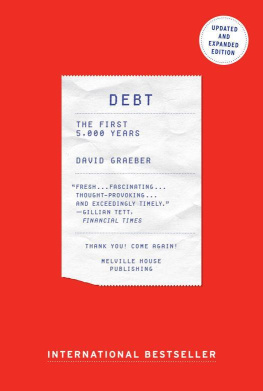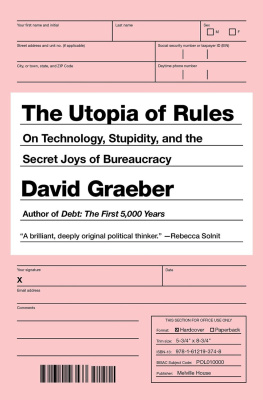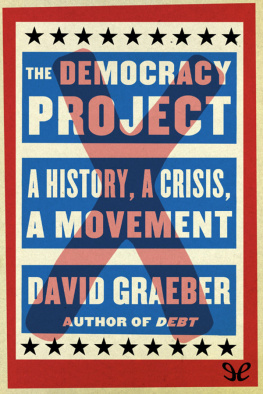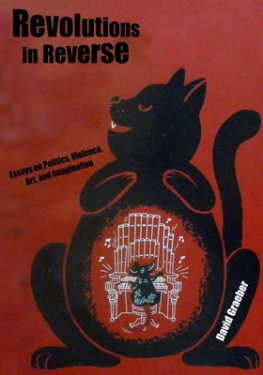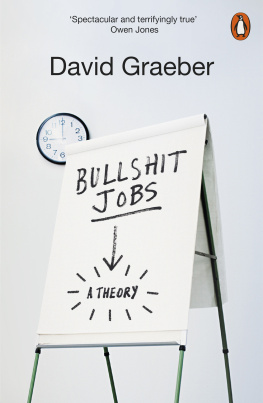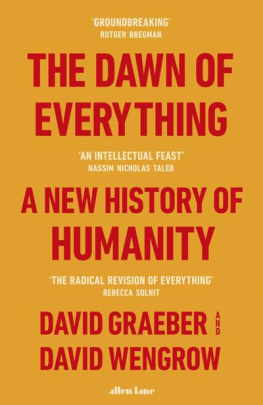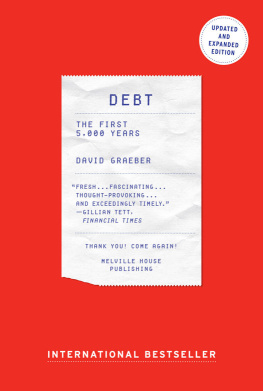PRAISE FOR DAVID GRAEBER AND
DEBT: THE FIRST 5,000 YEARS
Winner of 2012 Bread and Roses Award for Radical Publishing
Winner of 2012 Gregory Bateson book prize, awarded by the Society for Cultural Anthropology
A brilliant, deeply original thinker.
REBECCA SOLNIT, AUTHOR OF A PARADISE BUILT IN HELL
Fresh Fascinating Graebers book is not just thought-provoking, but also exceedingly timely. His sweeping narrative history essentially argues that many of our existing ideas about money and credit are limited, if not wrong.
GILLIAN TETT, FINANCIAL TIMES
A lengthy field report on the state of our economic and moral disrepair. In the best tradition of anthropology, Graeber treats debt ceilings, subprime mortgages and credit default swaps as if they were the exotic practices of some self-destructive tribe. Written in a brash, engaging style, the book is also a philosophical inquiry into the nature of debtwhere it came from and how it evolved.
THOMAS MEANEY, THE NEW YORK TIMES BOOK REVIEW
Exhaustive Engaging An authoritative account of the background to the recent crisis. Both erudite and impertinent, [Graebers] book helps illuminate the omissions of the current debate and the tacit political conflicts that lurk behind technical budget questions.
ROBERT KUTTNER, THE NEW YORK REVIEW OF BOOKS
The book is more readable and entertaining than I can indicate It is a meditation on debt, tribute, gifts, religion, and the false history of money. Graeber is a scholarly researcher, an activist, and a public intellectual. His field is the whole history of social and economic transactions.
PETER CAREY, THE OBSERVER
Fascinating [An] extraordinary book, at once learned and freewheeling.
BENJAMIN KUNKEL, LONDON REVIEW OF BOOKS
An engaging book. Part anthropological history and part provocative political argument, its a useful corrective to what passes for contemporary conversation about debt and the economy.
JESSE SINGAL, BOSTON GLOBE
An alternate history of the rise of money and markets, a sprawling, erudite, provocative work.
DRAKE BENNETT, BLOOMBERG BUSINESSWEEK
Terrific In the best anthropological tradition, [Graeber] helps us reset our everyday ideas by exploring history and other civilizations, then boomeranging back to render our own world strange, and more open to change.
RAJ PATEL, THE GLOBE AND MAIL
Fascinating One of the years most influential books. Graeber situates the emergence of credit within the rise of class society, the destruction of societies based on webs of mutual commitment, and the constantly implied threat of physical violence that lies behind all social relations based on money.
PAUL MASON, THE GUARDIAN
A formidable piece of anthropological scholarship [A] sweeping global history In tracing the genealogy of the noxious form of debt that we are familiar with today and contrasting it against an ancient, society-grounding conception of human indebtedness, Graeber has given us a significant piece of historical scholarship, one that demonstrates how a new understanding of debt might provide us with some clues for the future.
JUSTIN E. H. SMITH, BOOKFORUM
Debt may assume for the Occupy movement the theoretical importance that Michael Hardt and Antonios Negris Empire (2000) did for anti-globalisation campaigners during the past decade. Moving between ancient Mesopotamia, the medieval Crusades, the Atlantic slave trade, and innumerable other historical epochs, his 500-page study argues that although debt has always been the basis of human society, it is not the same thing as money.
SUKHEV SANDHU, THE TELEGRAPH
David Graebers Debt: The First 5,000 Years can be seen both as an anthropologists contribution to the new global history and as the intellectual credo of an anti-capitalist scholar-activist. The project of writing a history of financial contrivances nicely combines a deconstruction of debt and the case for seeing the crash of 2008 as a critical turning point. In this optic, recent events are a further twist in an age-old contest between rich and poor, creditors and debtors, the money machine and the cause of human survival and flourishing. It is written with engaging good humour and a winning radical generosity.
ROBIN BLACKBURN, NEW LEFT REVIEW
If anthropology consists of making the apparently wild thought of others logically compelling in their own cultural settings and intellectually revealing of the human condition, then David Graeber is the consummate anthropologist. Not only does he accomplish this profound feat, he redoubles it by the critical tasknow more urgent than everof making the possibilities of other peoples worlds the basis for understanding our own.
MARSHALL SAHLINS, CHARLES F. GREY DISTINGUISHED SERVICE PROFESSOR EMERITUS OF ANTHROPOLOGY AND OF SOCIAL SCIENCES AT THE UNIVERSITY OF CHICAGO
I am grateful to David Graeber, an anthropologist and the intellectual leader of the Occupy movement, for his Debt, which is brilliant, unexpectedly funny, and provides many bracing perspectives on the subject.
LEWIS JONES, THE SPECTATOR
An absolutely indispensableand enormoustreatise on the history of money and its relationship to inequality in society.
CORY DOCTOROW, BOINGBOING
Controversial and thought-provoking, an excellent book.
BOOKLIST
A dazzlingly syncretic, coherent, and multi-faceted effort to re-narrate virtually the entirety of human history, by starting from a concept and opening outward to include everything else A deconstruction of the terms through which we have learned to think about what human civilization, history, and society are and are supposed to be (which is to say, the language we use to make claims upon it) Its a really fucking good book.
AARON BADY, THE NEW INQUIRY
Graebers body of anthropological work is highly regarded, yet his style of writing is not academic but almost chatty. Some scholars use academic language to reach and extract the deepest of ideas; Graeber is able to do thisreach, extract, exchange deep and startling ideaswith plain language The book is a dense mix of economics, history, and anthropology. And always, these visits to different times and cultures reveal something surprising about debt and money.
CHARLES MUDEDE, THE STRANGER
A grand intellectual project and a call for action.
JEFFERY ATIK, LOS ANGELES REVIEW OF BOOKS
The world of borrowing needs a little demystification, and David Graebers Debt is a good start.
THE L MAGAZINE
This timely and accessible book would appeal to any reader interested in the past and present culture surrounding debt, as well as broad-minded economists.
LIBRARY JOURNAL
I consider him the best anthropological theorist of his generation from anywhere in the world.
MAURICE BLOCH, PROFESSOR OF ANTHROPOLOGY AT THE LONDON SCHOOL OF ECONOMICS
DAVID GRAEBER teaches anthropology at the London School of Economics. He is the author of Toward an Anthropological Theory of Value, Lost People: Magic and the Legacy of Slavery in Madagascar, Fragments of an Anarchist Anthropology, Possibilities: Essays on Hierarchy, Rebellion, and Desire, and Direct Action: An Ethnography. He has written for Harpers, The Nation, The Baffler, The Guardian, Al Jazeera, and the New Left Review.
In the summer of 2011, he worked with a small group of activists to plan Occupy Wall Street. In Times 2011 Person of the Year feature on the Protestor, Kurt Andersen wrote that Graeber nudged the group to a fresh vision: a long-term encampment in a public space, an improvised democratic protest village without preappointed leaders, committed to a general critiquethe U.S. economy is broken, politics is corrupted by big moneybut with no immediate call for specific legislative or executive action. It was also Graeber, a lifelong hater of corporate smoke and mirrors, who coined the movements ingenious slogan, We are the 99%.

